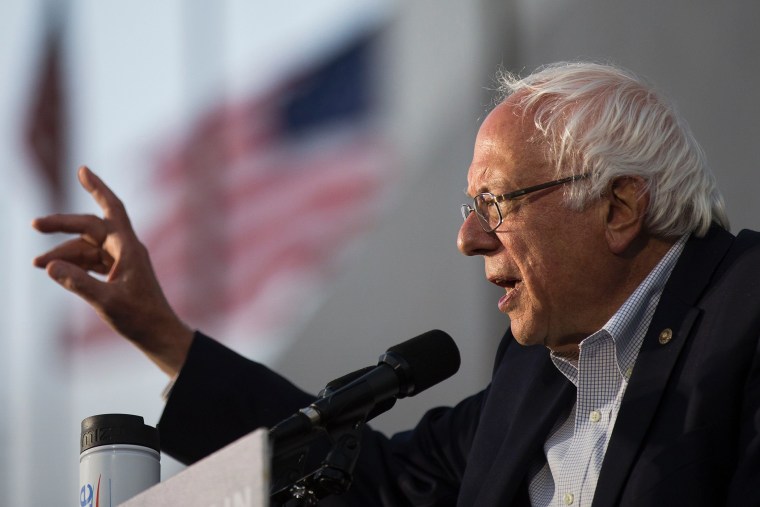Representative Peter Welch, a fellow Vermonter who endorsed Sanders in February, fretted that continuing his campaign could be counterproductive to Sanders' goal of securing policy and procedural commitments. "Some believe -- and it appears this is Bernie's view -- that the longer he stays in, the more effective he'll be in negotiating. My view is that the sooner we get unified the better," Welch said on Thursday before Sanders spoke. "Bernie doesn't give up any leverage by acknowledging explicitly that Hillary will be the nominee." Jim Manley, a former communications strategist for Senate Minority Leader Harry Reid, said Sanders risks "marginalizing" himself, both in the campaign and upon returning to the Senate, if he doesn't accept that he has lost.
At the crossroads, Bernie Sanders has a decision to make
Sometimes there's more to be gained by climbing aboard a moving train, rather than waiting at the station.

Bernie Sanders is, as of this morning, a candidate for the Democratic presidential nomination. What that means in practical terms, and when this fact will no longer be true, is a little murky.
For all intents and purposes, the Sanders campaign appears to have run its course. There are no more primaries. There are no more caucuses. The senator's campaign manager has conceded that Team Sanders is making no effort to woo superdelegates. Many of the Vermonter's most notable supporters have urged him to wrap things up, have already switched their backing to Hillary Clinton, or both.
And yet, when Sanders delivered a lengthy video address on Thursday night, he described his vision for a progressive national platform, but he did not concede the race despite his second-place finish; he didn't endorse Clinton; and he gave no indication of when he might drop out. Making matters a little more complicated, Sanders' campaign manager told MSNBC on Friday that the senator is still an "active candidate for president."
Bloomberg Politics had a good report the other day on whether Sanders' strategy is his smartest play given the circumstances.
I can appreciate why some of this may seem counter-intuitive. Sanders likely believes he has more leverage by withholding his support and remaining an "active candidate for president." The moment he concedes and/or endorses Clinton, the argument goes, Democrats will effectively declare, "Now that we got what we want from Sanders, we can start ignoring him." The longer he holds out, the more he protects his relevance.
But if that is what the senator and his team are thinking, it's probably backwards.
As the general election gets underway, the Clinton operation is moving forward with its national strategy, gradually consolidating support, and feeling good about its chances given recent polling and the Republican nominee's antics. Once it was obvious that the Democratic race was over, Sanders could have taken steps to make sure he was part of the team, contributing to the party's enterprise, and guaranteeing himself a seat at the proverbial table.
But Sanders has instead held back, waiting for a moment of maximum leverage that probably passed several weeks ago.
Politico reported on Friday that the senator's aides believe "that continuing to pull Clinton and the party to the left is only achievable as long as Sanders is still formally a candidate with a considerable number of delegates behind him at the July convention." Maybe. But as we've seen in previous cycles, sometimes alliances produce results, too. Presumptive presidential nominees are generally more inclined to listen to members of his or her broader team, not those on the outside looking in.
There may be considerations in this drama that aren't immediately obvious. Perhaps Sanders' finances have gotten a little messy and he's hoping to strike some kind of arrangement that will help him retire campaign debts. Maybe Sanders is quietly thinking Clinton will face an indictment over email server protocols, so he'll bide his time, just in case. (For the record, even an unlikely indictment wouldn't necessarily make Sanders the nominee. We know candidates can run anyway -- hello, Rick Perry! -- and there's no guarantee Democratic superdelegates would be persuaded to undo the primary results, handing the nomination to the candidate who lost.)
Whatever the motivation, sometimes there's more to be gained by climbing aboard a moving train, rather than waiting at the station.
Sanders has multiple considerations right now -- weighing what's best for the country, the party, and his own burgeoning movement -- but what if the best course for each priority is the same action?